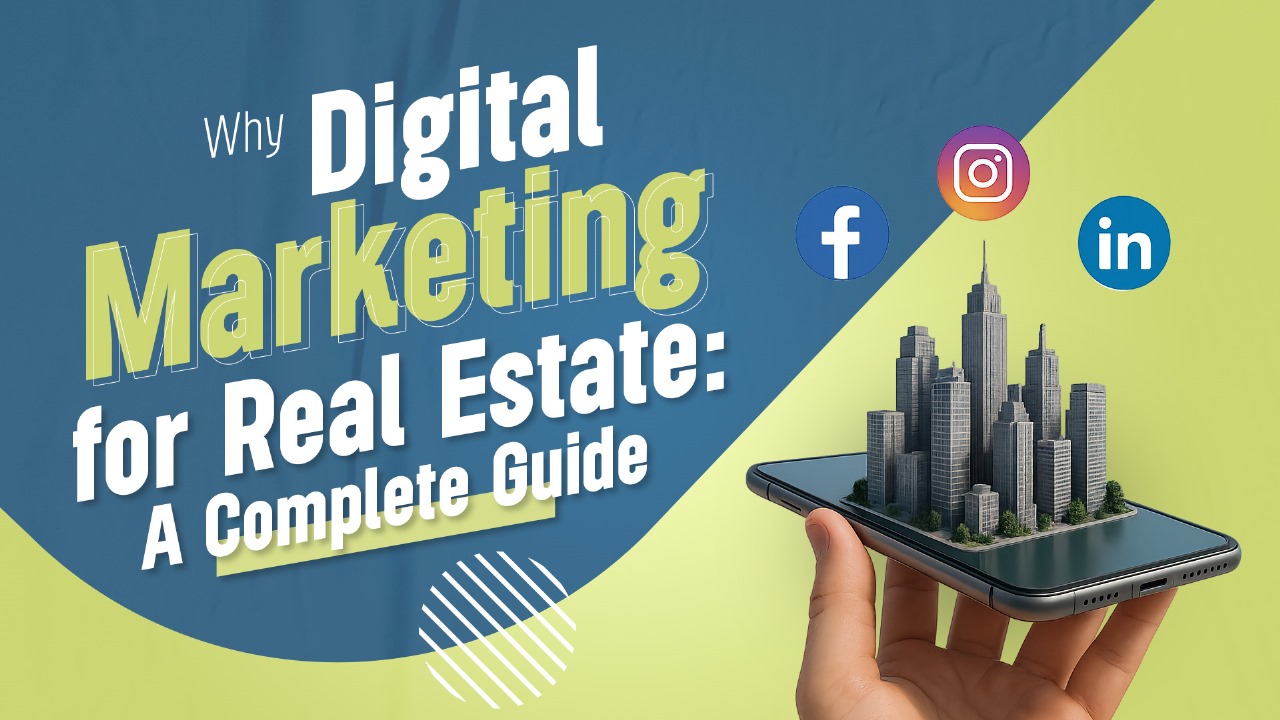

It was a wet Thursday morning when the real estate developer called us.
“I have put up hoardings, spent money on newspaper ads, and even tried radio advertising. But the apartments aren’t selling. The buyers just aren’t responding anymore.”
Sound familiar? It happens more often than not these days. Buyers no longer look at print ads, leaflets, or newspaper supplements when they want to make one of the biggest investments of their lives. They hop onto Google, watch YouTube walkthroughs, scroll Instagram posts, and shortlist properties before picking up the phone.
Digital marketing services are the heart of real estate sales today. Done right, it can turn an average property listing into a must-visit home. In this blog, we’ll explore the most effective ways to find buyers, generate quality leads, and close deals faster.
Why Digital Marketing Matters in Real Estate
Key Digital Marketing Strategies for Real Estate
1. Build a User-Friendly Website
Your website is your 24/7 sales representative. A messy, outdated site can instantly turn off potential buyers. A great real estate website should include:
- High-quality images and videos for each property.
- Virtual tours so remote buyers can experience the property.
- Search and filter options to easily find relevant listings.
- Lead capture forms with clear CTAs like “Book a Visit.”
- Mobile responsiveness (most searches happen on mobile).
💡 Tip: Add a chatbot or live chat feature to answer visitor questions instantly.
2. Use SEO to Rank on Google
Buyers begin their journey with a simple search like “2 BHK flats in Bangalore.” If your site isn’t SEO-optimized, you’re losing leads to competitors.
SEO Focus Areas:
- Local SEO: Target city & neighborhood searches.
- Content SEO: Blog posts like “Best Upcoming Neighborhoods in Pune.”
- Technical SEO: Optimize site speed, mobile performance, and structure.
💡 Tip: Consistent SEO efforts can generate a steady stream of organic leads.
3. Tell Stories on Social Media
Real estate is emotional. People buy security, comfort, and lifestyle—not just walls and roofs. Use social media to show the lifestyle your property offers.
Recommended Platforms & Content:
- Instagram & Facebook: Reels, walkthroughs, and community highlights.
- LinkedIn: Market trends, investment insights, case studies.
- Pinterest: Home design inspiration and neighborhood snapshots.
💡 Tip: Focus on storytelling—share moments like sunrise balcony views or a modern kitchen dinner setup instead of just “For Sale” posts.
4. Run Targeted Paid Campaigns
Organic reach is slow. Paid advertising puts you in front of the right buyers quickly.
- Google Ads: Target high-intent searches like “luxury apartments in Delhi.”
- Facebook & Instagram Ads: Target by location, income, and interests.
- Retargeting Ads: Remind site visitors about properties they viewed.
💡 Tip: Test multiple creatives—drone shots often outperform static images.
5. Nurture Leads with Email Marketing
Real estate buying isn’t impulsive. Email marketing keeps you top-of-mind during the long decision-making process.
- Send alerts for new property listings.
- Share market insights and client success stories.
- Offer exclusive event invites or promotions.
💡 Tip: Segment your email lists for personalized targeting.
6. Use Video Marketing for Impact
Video content builds trust and engages prospects better than text alone.
- Virtual tours for remote buyers.
- Aerial drone videos of neighborhoods.
- Video testimonials from happy buyers.
💡 Tip: Host videos on YouTube and embed them on your site for better rankings.
7. Manage Your Online Reputation
Good reviews build credibility, while negative ones can hurt sales.
- Encourage satisfied customers to leave Google reviews.
- Respond to negative feedback politely and quickly.
- Showcase positive testimonials on your site and social media.
8. Measure Performance with Analytics
Tracking results ensures you invest only in what works.
- Monitor Cost Per Lead (CPL).
- Track conversion rates from lead to site visits.
- Measure Return on Ad Spend (ROAS).
- Analyze engagement (likes, shares, watch time).
Read More: Why Digital Marketing is Important for Food and Beverage
Common Mistakes to Avoid
- Using stock photos instead of real property images.
- Ignoring mobile optimization when most traffic is from phones.
- Focusing only on likes and followers instead of conversions.
- Neglecting follow-ups and letting warm leads go cold.
The Future of Digital Marketing in Real Estate
- AR/VR property tours for virtual walkthroughs.
- AI-powered chatbots for instant lead qualification.
- WhatsApp marketing for personal engagement.
Early adoption of these tools gives real estate brands a strong competitive edge.
Final Thoughts
Real estate marketing is no longer about flyers and hoardings alone. The modern buyer’s journey is digital — from browsing to booking.
It’s not about selling property; it’s about creating an experience. Show buyers how they can live, work, and thrive in that home — that’s the heart of real estate marketing.




